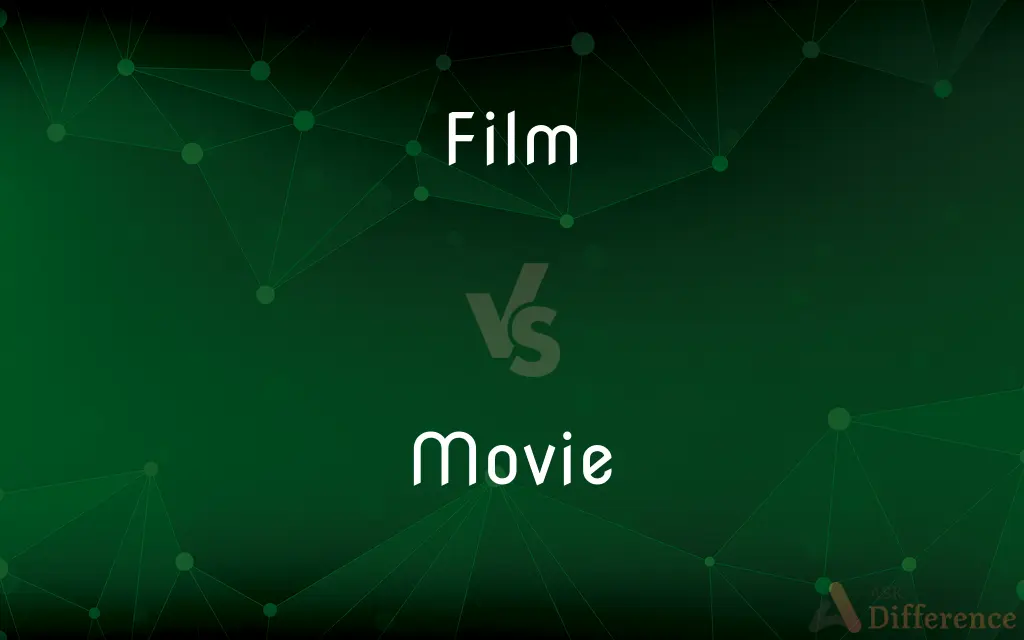Film vs. Movie — What's the Difference?
By Tayyaba Rehman — Updated on September 21, 2023
A film is a series of moving images recorded on material, while a movie refers to a feature-length cinematic production. Both terms are often used interchangeably in common speech.

Difference Between Film and Movie
Table of Contents
ADVERTISEMENT
Key Differences
In the realm of entertainment and media, the words film and movie often converge in meaning. While "film" originally referred to the physical medium, such as celluloid, on which moving images were recorded and projected, its meaning has expanded to encompass cinematic productions as a whole.
"Movie," a shortened form of "moving picture," is largely an American term and typically connotes a feature-length production intended for theatrical release or mainstream distribution. This word encapsulates the experience of watching a motion picture.
Although both terms are synonymous in many contexts, some purists draw distinctions. Film enthusiasts or critics might use "film" to indicate a sense of artistry or gravitas, emphasizing the art form itself. Meanwhile, "movie" might be reserved for more commercial or mainstream productions.
Around the world, the usage varies. In British English, "film" is commonly used in the same way Americans might use "movie." Regardless of the nuances, both words are deeply embedded in global culture, representing an art form that transcends boundaries.
In technical contexts, "film" might refer to the medium—whether celluloid or digital—while "movie" refers specifically to the content, the story told through moving images and sound.
ADVERTISEMENT
Comparison Chart
Definition
Originally, the physical medium for recording moving images.
A feature-length cinematic production.
Connotation
Often connotes artistry or seriousness.
Typically refers to mainstream, commercial productions.
Usage
More common in British English for cinematic productions.
Predominantly an American term for cinematic productions.
Origins
Derived from the actual film medium like celluloid.
Shortened from "moving picture."
Scope
Can mean the medium or the production itself.
Specifically refers to the content or the story.
Compare with Definitions
Film
A thin layer or coating.
She applied a film of moisturizer to her face.
Movie
A story or event recorded by a camera as a set of moving images and shown in a theater or on television.
The movie Inception was a big hit.
Film
A motion picture intended for cinema release.
The film received critical acclaim at various festivals.
Movie
A motion picture shown in cinemas or on television.
Let's go to the theater and catch a movie.
Film
A haze or blur caused by a substance or condition.
There was a film of dust on the windowsill.
Movie
A representation of a story or situation in the form of a sequence of images.
The movie adaptation of the novel was quite successful.
Film
A film, also called a movie, motion picture or moving picture, is a work of visual art used to simulate experiences that communicate ideas, stories, perceptions, feelings, beauty, or atmosphere through the use of moving images. These images are generally accompanied by sound, and more rarely, other sensory stimulations.
Movie
A recorded sequence of film or video images displayed on a screen.
I watched a horror movie last night and couldn't sleep.
Film
A thin skin or membrane.
Movie
A commercial, feature-length film production.
The movie's budget was over $100 million.
Film
A thin, opaque, abnormal coating on the cornea of the eye.
Movie
A recorded sequence of film or video images displayed on a screen with sufficient rapidity as to create the illusion of motion and continuity.
Film
A thin covering or coating
A film of dust on the piano.
Movie
Any work, as of art or entertainment, having this form, usually including a soundtrack
A movie about the cost of war.
Film
A thin, flexible, transparent sheet, as of plastic, used in wrapping or packaging.
Movie
The presentation of such a work
During the movie, the person in front of me kept talking.
Film
A thin sheet or strip of flexible material, such as a cellulose derivative or a thermoplastic resin, coated with a photosensitive emulsion and used to make photographic negatives or transparencies.
Movie
A long narrative work of this form
A television channel that shows foreign movies.
Film
A thin sheet or strip of developed photographic negatives or transparencies.
Movie
Movies Screenings of movies at a public theater
Would you like to go to the movies tonight?.
Film
A movie, especially one recorded on film.
Movie
Movies The movie industry.
Film
The presentation of such a work.
Movie
A recorded sequence of images displayed on a screen at a rate sufficiently fast to create the appearance of motion.
Film
A long, narrative movie.
Movie
A cinema.
Let's go to the movies.
Film
Movies collectively, especially when considered as an art form.
Movie
A motion picture.
Film
To cover with or as if with a film.
Movie
A motion picture show; the event of showing a motion picture. In the pl., the event of showing a motion picture at a movie theater; as, to go to the movies; to spend an evening at the movies.
Film
To record on film or video using a movie camera
Film a rocket launch.
Film a scene from a ballet.
Movie
The motion picture industry or medium, generally.
Film
To become coated or obscured with or as if with a film
The window filmed over with moisture.
Movie
A form of entertainment that enacts a story by a sequence of images giving the illusion of continuous movement;
They went to a movie every Saturday night
The film was shot on location
Film
To make or shoot scenes for a movie.
Film
A thin layer of some substance; a pellicle; a membranous covering, causing opacity.
A clear plastic film for wrapping food
Film
(photography) A medium used to capture images in a camera.
Film
A movie.
Film
Cinema; movies as a group.
Film
A slender thread, such as that of a cobweb.
Film
(ambitransitive) To record (activity, or a motion picture) on photographic film.
A Hollywood studio was filming on location in NYC.
I tried to film the UFO as it passed overhead.
Film
(ambitransitive) To visually record (activity, or a motion picture) in general, with or without sound.
Film
(transitive) To cover or become covered with a thin skin or pellicle.
Film
A thin skin; a pellicle; a membranous covering, causing opacity.
He from thick films shall purge the visual ray.
Film
Hence, any thin layer covering a surface.
Film
A slender thread, as that of a cobweb.
Her whip of cricket's bone, the lash of film.
Film
The layer, usually of gelatin or collodion, containing the sensitive salts of photographic plates.
Film
A flexible sheet of celluloid or other plastic material to which a light-sensitive layer has been applied, used for recording images by the processes of photography. It is commonly used in rolls mounted within light-proof canisters suitable for simple insertion into cameras designed for such canisters. On such rolls, varying numbers of photographs may be taken before the canister needs to be replaced.
Film
A motion picture.
Film
The art of making motion pictures; - used mostly in the phrase the film.
Film
A thin transparent sheet of plastic, used for wrapping objects; as, polyethylene film.
Film
To cover with a thin skin or pellicle.
It will but skin and film the ulcerous place.
Film
To make a motion picture of (any event or literary work); to record with a movie camera; as, to film the inauguration ceremony; to film Dostoevsky's War and Peace.
Film
A form of entertainment that enacts a story by a sequence of images giving the illusion of continuous movement;
They went to a movie every Saturday night
The film was shot on location
Film
A medium that disseminates moving pictures;
Theater pieces transferred to celluloid
This story would be good cinema
Film coverage of sporting events
Film
A thin coating or layer;
The table was covered with a film of dust
Film
A thin sheet of (usually plastic and usually transparent) material used to wrap or cover things
Film
Photographic material consisting of a base of celluloid covered with a photographic emulsion; used to make negatives or transparencies
Film
Make a film or photograph of something;
Take a scene
Shoot a movie
Film
Record in film;
The coronation was filmed
Film
A series of moving images, especially those recorded on material and projected onto a screen or other surface.
We watched an old black-and-white film last night.
Film
The medium on which moving images are recorded.
Traditional photographers still prefer to shoot on film.
Common Curiosities
Are film and movie interchangeable terms?
In many contexts, yes, but there can be subtle distinctions based on artistry or medium.
Is "film" more commonly used in British English?
Yes, in British English, "film" is often used where Americans might say "movie."
Can a video shot on a smartphone be called a film?
While traditionally "film" referred to celluloid, modern usage allows for digital recordings to also be termed "film."
Why is "movie" shortened from "moving picture"?
"Movie" is an informal contraction emphasizing the motion aspect of the medium.
Does a film always have a serious or artistic connotation?
Not always, but some purists might use "film" to indicate a higher level of artistry.
Can a documentary be called a movie?
Yes, documentaries can be referred to as movies, especially if feature-length.
Are all movies shown in theaters?
No, some movies are made for television, streaming, or direct-to-video release.
Share Your Discovery

Previous Comparison
Radiator vs. Convector
Next Comparison
Tandoor vs. TikkaAuthor Spotlight
Written by
Tayyaba RehmanTayyaba Rehman is a distinguished writer, currently serving as a primary contributor to askdifference.com. As a researcher in semantics and etymology, Tayyaba's passion for the complexity of languages and their distinctions has found a perfect home on the platform. Tayyaba delves into the intricacies of language, distinguishing between commonly confused words and phrases, thereby providing clarity for readers worldwide.
















































